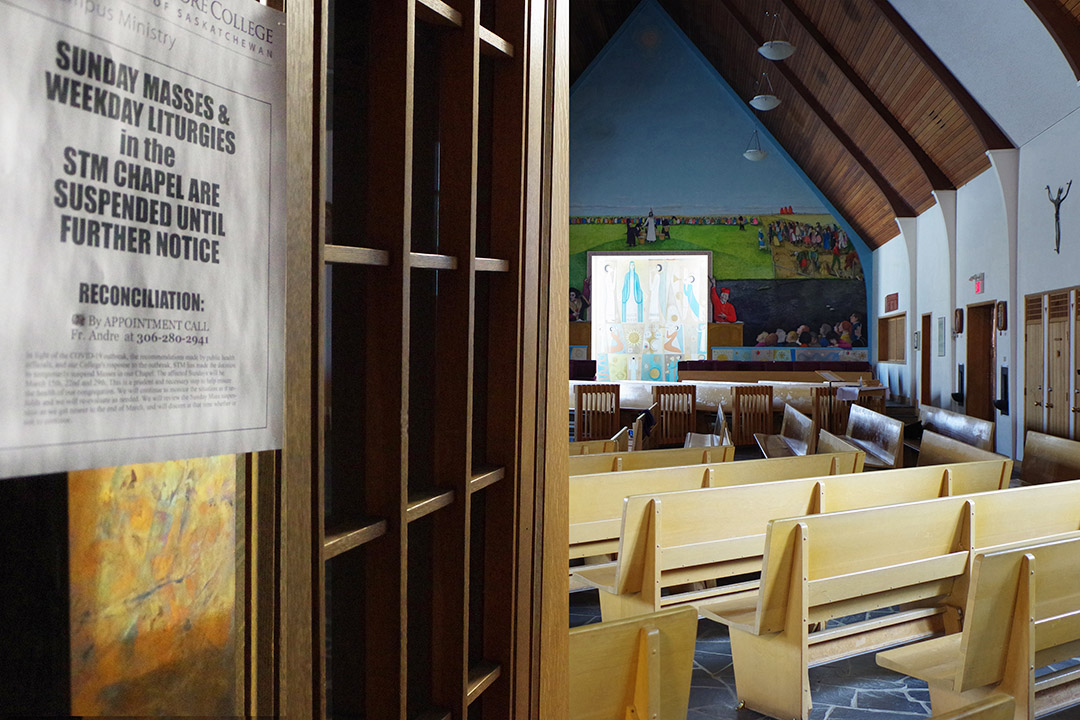
Keeping the faith: STM ministering remotely during pandemic
This spring, the world is facing a new enemy: COVID-19. The life-threatening pandemic brought people together with communal resolve, seeking strength and support from family, friends, community, and their faith.
By Jacquie BergSt. Thomas More College (STM), the Catholic college at the University of Saskatchewan (USask), erected its stone chapel 70 years ago. It has served as a gathering place for students, faculty, staff, and the worshipping community, in prayer, liturgical celebrations, concerts and lectures. However, in a historic decision on March 15, the chapel doors at STM were closed for the first time, ending daily mass and weekly youth group gatherings and prayer sessions, while adhering to provincial guidelines to restrict the spread of the COVID-19 virus.
While COVID-19 restrictions resulted in suspending gathering in physical spaces, new doors have opened with creativity and resourcefulness, to redefine the ways the faithful can safely maintain community and facilitate gatherings in a virtual space.
Dr. Gertrude Rompré (EdD), director of mission and ministry for STM, finds hope and positivity have risen from these dark times.
“We’ve come to see each other as community in a new way,” Rompré said. “The strength of our relationships has been revealed. We also have developed new skills to connect, strengthened our resiliency, and been witness to numerous examples of compassionate service to others in need.”
STM’s Campus Ministry Team is adapting their roles to this new normal by providing resources, checking in and caring for each other—functioning as a community, although not physically present.
“We have a sense of still being connected as a community, although we’re not in the same space,” said Rompré. “Our team continues to reflect on new ways to help students, build community and deepen faith, as well as engaging with students in acts of justice, service and charity, while maintaining physical distancing. Physical distancing does not have to mean social or spiritual distancing. Indeed, this is a time to strengthen our social and spiritual connections.”
Technology today has enabled numerous opportunities to gather and minister remotely. Beyond email and texting, a reliance on remote learning, virtual team meetings, social media and videos are now normal communication and socialization vehicles. Mass and daily liturgical activities are now functioning in a remote setup.
“We are trying to incorporate video and use the actual chapel to remind how we would gather or use that space,” said Rompré.
Leading up to Easter, STM campus ministers shared videos from within the chapel, reflecting changes in the altar, linens and symbols, along with accompanying recorded reflections and song. STM’s worshipping community is provided with an electronic bulletin and links to other parishes in the diocese that are live-streaming mass. Providing inspiration and spiritual leadership, the college shared Easter reflections from Fr. Ron Griffin, CSB, past STM faculty member and current college chaplain.
With a focus on pastoral care, some of the varied initiatives the team has developed to remain engaged and supportive include maintaining Share Lent initiatives; video and meditation techniques for centering prayer to reduce anxiety; sending out weekly inspiring messages; an interfaith virtual prayer service, along with prayer and reflections. STM Campus Ministry also offered an online Lenten retreat, which attracted more than 90 participants.
Mandated social distancing adds to anxiety during what is already a very stressful time in the academic year and there are still limits to virtual community. Not all students and community members have access to the same level of technology, and many struggle without personal contact. Rompré worries about those isolated.
“We don’t know who is being missed,” he said. “If we don’t have a way to connect, we may not know they are in need.”
As social distancing restrictions extended into Easter, Rompré draws a comparison of freedoms lost due to pandemic restrictions to a type of ‘fasting’ from liturgical life—missing it makes it more precious to us.
“In this moment, in a most profound way, we are living out the mystery that we celebrate each Easter: the darkness of Good Friday that gives way to hope and new life on Easter morning.”

